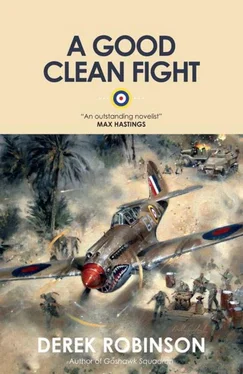There was neither time nor space for tactical subtlety or skilled maneuver. It was simply a matter of who fired first and who fired longest. The two pairs of Vickers Ks in the second jeep swamped the first German truck, killed the driver, killed the troops, sent the truck headlong into the stone wall of the wadi. As that happened the second German truck turned the corner and a machine-gunner on its cab found the jeep and sprayed it very thoroughly. The jeep had no protection, no armor, nowhere to hide. Sergeant Davis, Trooper Connors, Blake the fitter, all died. This was completed in a matter of a few seconds.
Lampard had overshot the action. In his desperation to reverse he found the wrong gear, bashed a wheel against a rock, found reverse, sent his jeep sprinting backward. There was a very brief point-blank battle between the double pair of Vickers Ks in his jeep and the machine-gunner in the second truck, aided by a dozen rifles. The German soldiers had been well drilled: they got off a useful volley of shots and the machine-gunner fired over their heads. But the Vickers Ks erupted with a blast of two hundred bullets in five seconds. They had been designed to destroy airplanes. They wiped out the second truck. It was a mismatch, the dream of every soldier, to find the enemy exposed and out-gunned and to overwhelm him, kill him ten times over, give him not the fraction of a chance. The fight was over in the time a man might hold his breath. The echoes bounced from wall to wall of the wadi like a ball game. The second truck caught fire. Its fuel tank exploded with a gentle, almost apologetic, boom.
The mismatch had not been complete. Of the three men with Lampard in his jeep, one—a gunner called Sharp—was dying, hit by a bullet in the chest. Another, Menzies, had a broken jaw, smashed by a spinning ricochet. He was in great pain; he could barely spit out the fragments of teeth that threatened to choke him. Trooper Smedley was untouched, although the hole in his cheek had started to bleed again. Lampard had been largely protected by the gunners alongside and behind him. A bullet had struck his right ear and left it flapping; blood coated his face and neck. The jeep would not start.
While Menzies and Smedley carried Sharp away, Lampard ran back and looked at Sergeant Davis’s jeep. The three men in it were sprawled or twisted in the uncomfortable attitudes of most battlefield corpses. He took their identity discs. This was a messy business: it left his hands sticky with blood. Already the flies had begun to feast. It would be a great day in fly history. He spread pieces of clothing over the dead faces. “Rest in peace,” he said. This jeep would not start either. The shimmer of spilled petrol hung around its broken tanks.
Menzies and Smedley were kneeling beside Sharp. His chest was a mass of sodden field-dressings and his eyes were almost closed. Lampard kneeled and gripped Sharp’s hand. Tiny pink bubbles kept forming and breaking and reforming at Sharp’s mouth. The bubbles got smaller and fewer, and he died. Lampard took his identity disc. “Rest in peace,” he said. “The jeeps are kaput. We’ll have to walk. Bring water and a weapon.”
* * *
Fort Lamy seemed like a very pleasant town. The streets were broad and lined with shade trees. Schramm saw a square with a fountain playing. A restaurant had tables outside it. The food in Fort Lamy would be a lot better than in Benghazi: trust the French to export the best part of their culture to the colonies! “Nice place to sit out the war,” he said.
“If there’s just one fighter with loaded guns here you won’t be going home to Barce,” the pilot said.
“Relax. They arm the Hurricanes in Egypt.”
“So you say.” The pilot was nervous. He had never made such a low, slow approach to a target in broad daylight. He could see people down there pointing up at him. If the airfield had just one anti-aircraft gun it could scarcely miss.
“Left a little,” di Marco said. He had already seen aerodrome buildings ahead. The pilot adjusted.
“Tell me when you want a smoke marker,” he said. By dropping a marker he could discover the wind strength and direction.
“Not necessary,” di Marco said. Smoke from chimneys was rising almost vertically. He lay face-down in the nose, looking through the bomb-sight.
Schramm saw the Hurricanes before the Heinkel crossed the boundary. They were lined up, wingtip to wingtip, as if on parade. He counted twenty-three. “Left, left,” di Marco said. “More… more… more… No, that’s not good. We’re off-target. Make another approach, please.”
As they flew over the Hurricanes, Schramm realized that there was no flak, no tracer, and nobody was taking off. The whole scene was placid. A few men looked up. One ran.
Their second approach was better, and di Marco bombed after only a few corrections. They all felt the Heinkel bounce a little when the load detached. Schramm turned and looked back as the Heinkel banked and climbed. Di Marco’s aim had been precise. One instant the Hurricanes stood like perfect reproductions of each other; the next instant the stick of bombs rapidly flowered along their line, so quickly that it looked like a magician’s trick, a string of silent blossoms of energy destroying the fighters and flinging the bits high in the air.
“Well done,” Schramm said. It seemed inadequate.
“Make a circuit,” di Marco said.
More people were out on the airfield now; quite a crowd. Schramm thought he could see men with rifles, but of course the range was hopeless. Smoke and dust were thinning over the Hurricanes’ graveyard. Recognizable pieces lay all around: wingtips, wheels, rudders, propellers. Several wrecks were burning.
They flew around the field. “I think I see some machines inside that hangar,” the pilot said.
“Not fighters,” di Marco said. “There is a fuel dump in the northeastern corner of the field. We should bomb that.”
They made their approach. Schramm saw a stack of square tins that looked as big as a small house. “Right…” di Marco said. “Steady. Right… Steady. Now left… Steady. Good. Good. Good. Bombs gone.” Again the Heinkel bucked a little.
The stick straddled the fuel dump. It set off a series of explosions, each greater than the last, each pumping a rush of flame that burst like a balloon to release a bigger, fiercer upsurge. Rich black smoke boiled into the sky. Within a minute it was twice as high as the bomber. Schramm had nothing to say. This was more than a fire. It was an act of God. It was beyond words.
The pilot made half a circuit so that di Marco could take photographs. Then he put the nose down, crossed the field low and flat out, and beat up the crowd. Most of them ducked; Schramm did not blame them. The Heinkel climbed steeply over the hangars and cruised away. “Steer zero-two-zero,” di Marco told him.
“I know,” the pilot said.
“Well, that was fairly successful,” Schramm said.
“That was the easy bit,” the pilot said. “That was like going to the bar on the corner for a beer.”
“How much fuel have we got?”
“Not enough,” the pilot said. “But we all knew that before we left, didn’t we?”
* * *
The first signal reached Cairo while the Fort Lamy fire crew was still hosing down the remains of the Hurricanes.
There was nothing they could do about the fuel dump. The heat was so intense that you could make toast a hundred yards from the flames, if you were stupid enough to stand there. Much of the fuel had been stored underground. The fire was only beginning when the bomber left the scene. Sixty thousand gallons of aviation fuel takes a lot of burning.
News of the raid hit Middle East HQ like a fox in a chicken house. Quite senior officers were seen running in its corridors. Even more senior officers were tracked down to Shepheard’s, or the Gezira, or a seat in the stalls for Gone with the Wind , and rushed back to their offices.
Читать дальше












